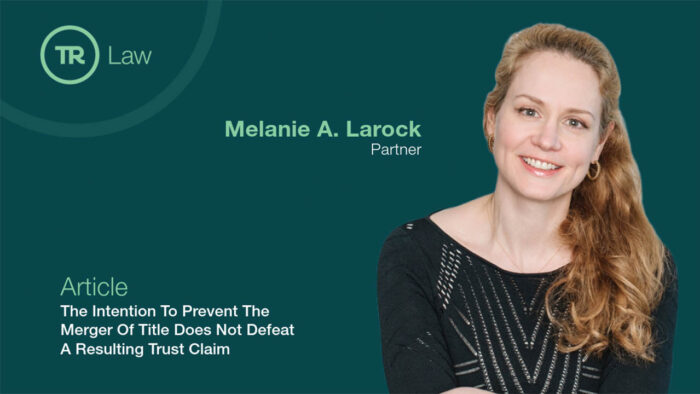The legal implications of virtual treatments and assessments
Author(s): Leonard H. Kunka, Stacey L. Stevens*
May 4, 2020
Thank you to everyone who attended our Thomson Rogers Webinar Series “The Legal Implications of Virtual Assessments” held May 6, 2020 conducted by Thomson Rogers’ personal injury lawyers Leonard Kunka and Stacey Stevens.
From the questions received, it appears that many of you have similar concerns. We have tried to group these questions together into a list of concise questions and answers, which we could share with all of you.
Please stay in touch with us and let us know about any issues you may encounter as we all try to work our way through these challenging times.
Questions & Answers
Q1: Has there been an example of an insurer funding equipment for the purposes of virtual treatment.
We are aware of at least one insurer (Intact) who agreed to fund a computer to permit virtual treatment and also to allow the purchase of some programs which a speech language therapist and OT indicated they could utilize to continue service to a client.
Q2: Does providing service by Zoom meet confidentiality requirements?
The concerns regarding Zoom and privacy have been somewhat exaggerated. As long as you set up an individual login session and password, the Zoom platform is secure. After the initial suggestions that Zoom sessions could be hacked, Zoom installed further encryption protection to make zoom conferences secure. As lawyers, we are using Zoom for various Court procedures, including pretrials, motions, case conferences etc. If there was a concern regarding privacy, or the ability for people to hack into these types of video conferences, the government would not be using this platform for the Courts.
Q3: What type of wording should be used in the treatment plan to advise an insurer that the treatment is being done virtually?
Any wording which conveys that this is an alternative form of treatment which is being implemented because of the COVID-19 restrictions. It might be advisable to start off by saying that because the in-person treatment which you are recommending for a client cannot be completed because of the COVID-19 restrictions, you are submitting a treatment plan for alternative tele-health, or video conference treatment sessions to maintain some continuity of treatment during the COVID-19 government restrictions.
We understand that HCAI had a code “IN” for indirect treatment, which many treatment providers objected to because their colleges still consider video conference sessions to be direct treatment. We do not have access to the HCAI coding, so we are unsure if this coding remains on the HCAI system. Consult with your college as to whether video conferencing is considered direct treatment or determine if you college has found an appropriate code under HCAI for services provided by one of these alternative platforms.
Several of the attendees of the webinar responded that they have coded their “virtual” treatments as direct treatment, and they have not had any denials from insurers on that basis.
Q4: Insurers are requesting that billing for virtual treatment sessions be submitted via HCAI using “IN” (the code for indirect treatment) or “SD” (the code for self-directed) rather than billing it as direct treatment. This is concerning as many Colleges specifically recognize video conference or tele-health as a method of providing direct treatment. Do we have to follow this request given that it goes against our College Guidelines? Some adjusters are saying they will not pay for services that do not adhere to the closure of non-essential services so if we do not use the IN/SD code the adjuster cannot confirm if it was treatment delivered in person contrary to the closure or via telepractice.
There is a clear conflict between the College Guidelines that recognize video conferences/telehealth as a form of direct treatment and the recent HCAI bulletin that limits direct treatment to in person sessions. Firstly, you should always consult with your College as to whether video conferencing is considered direct treatment or determine if you college has found an appropriate code under HCAI for services provided by one of these alternative platforms.
This question was briefly discussed during the program. Several of the attendees responded that they have coded their “virtual” treatments as direct treatment, and they have not had any denials from insurers on that basis. However, this may have been before the HCAI directive dated April 18, 2020. Given the wording in the HCAI directive, and without support from the IBC, there is a risk going forward payment for services will be denied depending on the adjuster.
If your College is one that recognizes video conferences/telehealth as direct in person treatment, it is advisable that you speak to the adjuster directly before submitting your invoice for services
Q5: Following up on the issue of reporting, would it be advisable to do an addendum to any report created during the COVID-19 restrictions, once the restrictions are lifted?
It certainly would be helpful to have a report which outlines any declines in function or difficulties the client encountered during the restriction period. That type of report might accompany a treatment plan for increased service immediately upon the lifting of restrictions, as many treatment providers may find that clients have regressed during the period of restriction, and therefore additional support may be necessary when the ban is lifted.
Q6: Some clients are providing video clips to their treatment providers to demonstrate level of functioning. Some colleges suggest that those videos should be included in a treatment provider’s report. Should those videos be included?
This is a thorny issue. Generally your treatment sessions would not be recorded on video and you would simply report on your observations. It is difficult to understand why you would not be able to comment in a report on what you have observed in a video in the same manner, but by simply saying that you observed the patient performing some activity, that may raise a request from an insurer or their counsel to produce a copy of whatever you reviewed because they will know that during this period, you likely did not personally see the person. The problem with videos is that people interpret them differently, and someone else viewing the same video may not have the rehabilitation history with the client that you have, so that when you comment on the level of function demonstrated, it is with the benefit of knowing the client and how they have been progressing since the accident. What one person may view as a lot of function, you may actually view as very little improvement from a previous level of functioning and vice versa. Therefore it is always dangerous to provide video clips as part of a report, unless those clips are fully explained in the context of the historical treatment of the patient.
Q7: Is it adviseable to do FCC assessments by a video conference platform or will that hurt credibility or reliability in a Court?
Because much of a FCC assessment is based on in-person assessment of several different medical, rehabilitation and care needs, on the backdrop of reports and recommendations from each of a client’s treatment providers, a video FCC assessment would be less desirable. If an FCC is required urgently, then it is better than simply a paper review, but if the assessment can be postponed until the client can be seen personally that would enhance credibility.
Share this








